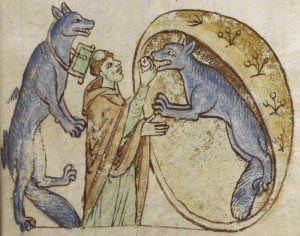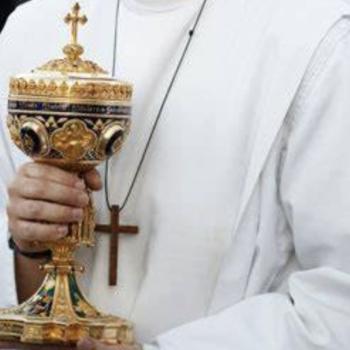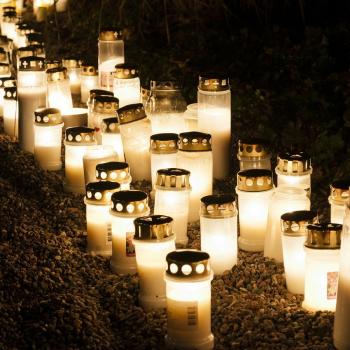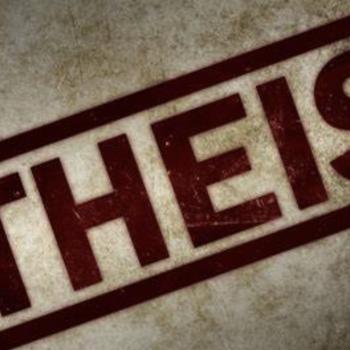
We invited some Sick Pilgrims over to talk about one of our favorite saints, St Patrick, in honor of his feast day this Friday, March 17. And then Jacob Popcak took us all to school.
First things first. St. Patrick wasn’t Irish.
Jacob Popcak: Patrick was a slave of the Irish, who escaped, became a priest, and came back to convert his captors. He loved them. Which is … insane, from a modern perspective.
David Russell Mosley: He wasn’t “Celtic,” or at least not Irish.
Jonathan Ryan: He was most likely Welsh/Roman.
Jacob: To get some context: Ireland was seen as the Wild West, even into the 1800s. So when you went there as a missionary, you knew what you were getting into. Ireland was seen as a group of people not worth saving, and Patrick wouldn’t stamp out their culture. His mission was to bridge the gap between pagans and Christianity, to endow pre-existsing pagan theologies with meaning. He established a relationship of reverence and respect which the Celtic people ultimately returned. He became so popular and beloved by the people – who didn’t always understand him and his fellow priests, but revered them – that they were fighting about where he’d be buried BEFORE HE DIED.
Jonathan: Everyone is talking about the Benedict Option, but I think the Patrick Option is way better. The Irish monks went out as a community, built communities and then invited the pagan communities to come and see.
Jess: They were evangelists.
David: And I think it key that Patrick’s evangelical mission was primarily to out-narrate the local religions.
Jonathan:Really, I think he’s the perfect patron for our time.
St. Patrick probably didn’t write the beloved “St. Patrick’s Breastplate” prayer.
Jess: It’s my favorite prayer–in it, Patrick calls on the power of Christ to protect him from the powers of witches and potions and spells and incantations.
Jonathan: That’s why he’s the saint for our time–because of his ability to combine story, mystery, and theology to re-enchant the world. That’s what we’ve lost. We think it has to be just one, when it needs to be all of them working together.
Jacob: Speaking of story… there’s a really amazing Irish legend, one of many actually, that says a priest was walking down the road when he encountered two wolves. At first he was afraid, but the story goes that the wolves spoke to him and told him that they were in fact werewolves cursed by sin to remain in that form. The shewolf was supposedly dying, and her mate requested that she be given last rights so that she would not be damned. The priest was concerned that he would be breaking some dogmatic rule, but was ultimately convinced by the wolves’ ability to speak and administered the Eucharist to the she-wolf before she passed away. That story, I think, is indicative of a broader view point within Irish Catholicism: that there are just some things that we can’t understand and that, while those things don’t necessarily deserve our endorsement, they do deserve our reverence and respect as being a part of a mysterious world that we as humble human beings cannot totally grasp.
Kevin Johnson: That’s what I wish we still had. But that mindset is often seen in contemporary times as superstitious. “You mean you think there could be fairies or ghosts or werewolves or the paranormal? Don’t you trust science and the explanation of the natural world that has given us so much technology, etc?”
Jacob: It’s important to mention, though, that the view point I mentioned wasn’t all leprechauns and roses. There was really dark crap too. THat kind of reverence for the mysterious comes with some dark territory that we should also learn from and get wise to. We can’t turn a blind eye to the dark, but we can’t try to stamp it out either. We have to take the sacraments and everything the church teaches with us like a Batman toolbelt and be willing to get our hands dirty, but also be humble enough to realize that there are just going to be some things at the end of the day that are a little too weird and a little too dark for us to possibly wrestle with, and furthermore recognize that that stuff belongs to God too.
St. Patrick’s Day is a much-needed festival of the weird (…and a travesty of faux-Irish culture.)
Rebecca Bratten Weiss: I think St Patrick’s day in the United States is a) a travesty of actual Irish culture, but also b) a fascinating indication of our bottled up need for carnivale, as well as the weird and upside down.
Jess: There is still something magical about St Patrick’s day. We make the rivers run green, we throw cabbage from parade floats, we get wildly drunk. There is a Lord of Misrule quality to the day, which the leprechaun embodies.
Kevin: It’s the last of the remnants of the “festival”–which we also see in Mardi Gras–the ancient and medieval world view about the relationship between the natural and supernatural. And the understanding of what ritual and such did/does. The “modern” world view approached it differently and so we are now in the modern and its aftermath. But people still crave to talk about and engage the mystery — that ineffable part of life — and the contemporary world view has no categories for it. We either rationalize it or dismiss it. There is no third box.
Jacob: St Patrick’s Day, Mardi Gras… these festivals are a collection of lots of different pagan/human desires longing to be fulfilled. Desires which, ultimately, only the Church and God can fulfill. For instance, we see in Saint Patrick’s Day and other examples of the “festival” trend Kevin mentions a longing for tradition, rituals, routines, things to look forward to … The Church, in answer, is sitting on literally a calendar of ritual and routine, and it’s worth noting that She invented most of these festivals in the first place. So as far as people’s longing for tradition and ritual goes, we’ve got them covered. We can give them more ritual and routine than they can handle, we can color coordinate the hell out of those rituals, and then we can endow it all with Divine meaning to boot.
Partying on St. Patrick’s Day is your obligation as a Catholic. Sort of. Not really. But you can make a case for it.
Jacob: And another Saint Patty’s Day example, regarding desire: drunkenness, while arguably wrong in most contexts, represents a deeper longing for communion and also, to an extent, a response to human suffering. I say this as a clinical mental health counselor who once mostly served alcoholics and heroin addicts. One learns pretty quickly in that clinical environment that people are either getting drunk to get close to others and to feel intimately connected to those around them — to a degree that they wouldn’t allow themselves to otherwise be vulnerable – or they’re trying to momentarily let go of their pain. The Church has the true answer to both.
Kevin: And drunkenness is about ecstasy. There is a legitimate aspect of the human that engages with transcendence. Stepping outside one’s self. Literal ek static. Our culture doesn’t want to talk about that either. It’s all “self.” Self empowerment. Self help. Etc. But there is an aspect of self that is paradoxically outside of oneself. And if the culture won’t speak to it we get drunk, rave, practice high endurance sports.
Jacob: There’s room in the Church for these customs. There’s room for the revelry. But there’s also room in the customs themselves to be endowed with sacramental meaning. We need to follow St. Patrick’s legacy and get down with the endowing.
Kevin: The arts, when done well, speak to that space [of ecstasy]. Point to it. We need Catholic art … pointing to transcendence … where the word experience doesn’t apply any more.
Jacob: In counseling, we have a rule developed by the Gottman Institute that says that, statistically, a healthy marriage can’t exist unless there’s a 4/1 ratio of positive interactions to criticisms. That’s the same relationship, I think, that the Church needs to have with every given issue. We need to spend 4/5 of the time pointing out what’s good and meaningful, and the other 1/5 of the time pointing out why the other 4 parts haven’t actually gone far enough.
I mean, there’s a reason why addicts and artists like Shakespeare and Warhol loved the Catholic mass. We took their need for something that’d overwhelm them and said, “Yeah, but we can hook you up with sensory overload FOR JESUS.”
As Catholics we’re trapped on this spectrum between fetishizing the old and vintage like a couple of coffee shop hipsters or castrating ourselves liturgically in the name of “welcoming everybody” like a couple of dime store hippies. Instead, we should be focusing on moving towards transcendence and overwhelming people with God. Giving them more that they can handle. That’s been the driving force behind every evangelical, liturgical, artistic, or narrative movement the Church has gotten right over the last 2000 years.
There are lots of ways to celebrate St. Patrick’s Day.
Jonathan: Drink beer and act absurd to the glory of God and to laugh at the princes of the world. Be holy fools.
But acting absurd can be meaningful. Not in a Dadaist way, but in a breaking forth sort of way.
However you celebrate St. Patrick’s Day, take some time to meditate on what it is you really desire. Hint: It’s probably not green beer.
Jacob: Whether we’re talking about drunkenness, or partying, or revelry, or desire to believe that werewolves and fairies exist out there in the dark somewhere, we’re still talking about the same thing. We’re talking about desire, as St. Augustine and St. John Paul II and St. Patrick all talked about. If we’re willing to sufficiently question our desires in the motives behind them, we’ll always always end up with God. If we question the longing for communion that erroneously drives us to indulge in green beer, we’re going to end up in communion with God. If we question the need for celebration that ultimately leads us to the ritual and routine of the church, we’re going to end up with God. If we go out and set traps for werewolves … well, I honestly don’t know what will happen, but I bet it will lead us to God.
Desire is the first thing, but humility is the second thing. It honestly takes a lot of humility to realize that there is stuff out there in the dark that we can’t wrestle with, and that furthermore would probably eat us if we let it. But it takes even more humility to realize that such stuff isn’t bigger than our God, and that, through baptism, He has given us the capacity to look the dark in the eye.
Rebecca; God often comes through the dark.












